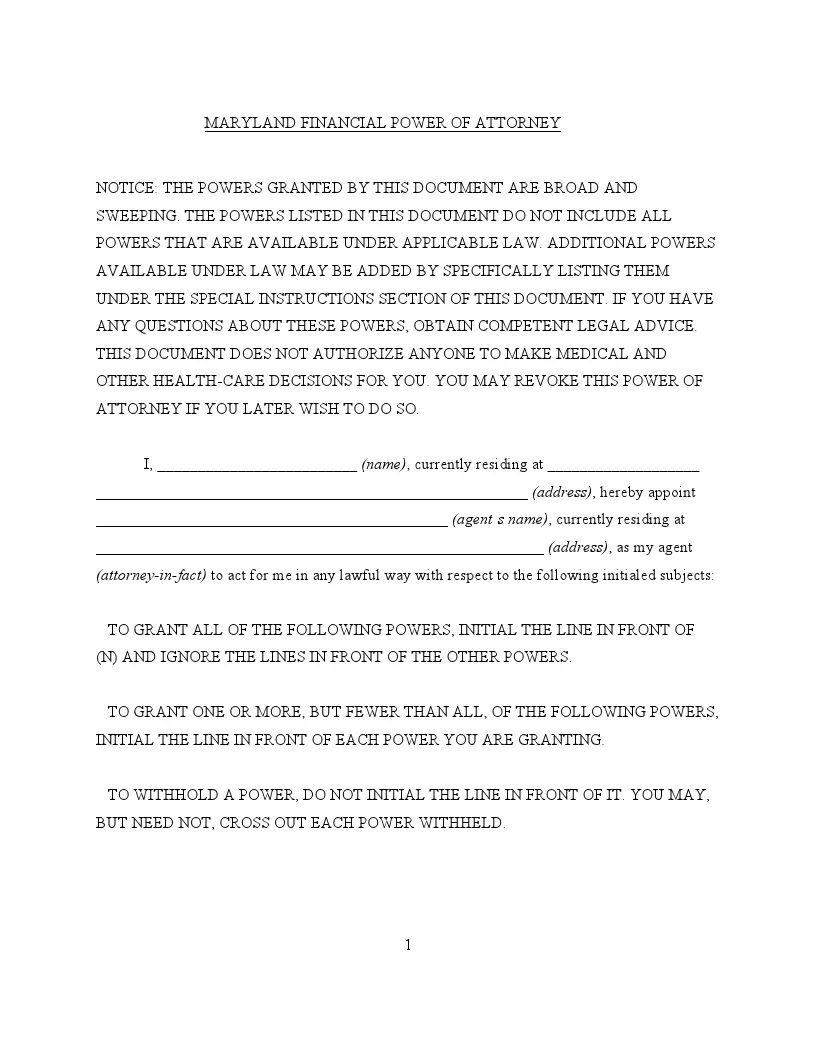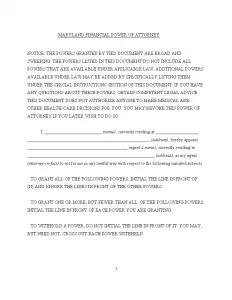Maryland General Financial Power of Attorney Form
The Maryland general financial power of attorney is an official document that allows a person, called the “principal,” to appoint another person, referred to as the “agent” or “attorney-in-fact,” to manage their financial affairs. This permission grants the agent significant authority to manage various financial tasks for the principal, such as banking activities, property deals, and overseeing personal assets.
All power of attorney forms in Maryland must meet specific legal requirements. Additionally, it should comply with Maryland’s statutory form or include certain legal phrases and disclosures recommended by state law. For those needing to handle legal and financial affairs, our Maryland power of attorney forms provide a structured way to appoint a trusted individual as an agent.

Build Your Document
Answer a few simple questions to make your document in minutes
Save and Print
Save progress and finish on any device, download and print anytime
Sign and Use
Your valid, lawyer-approved document is ready
The Maryland Code outlines general power of attorney regulations in Sections 17-101 to 17-204. This code provides a structured legal system for handling personal and financial matters with a designated representative.
According to Section 17-101 of the Maryland Code, a “power of attorney” is any writing or record allowing an agent to act on behalf of the principal, even if it doesn’t specifically use the term “power of attorney.” As specified in Section 17-110, key signing requirements include:
- The general power of attorney must be documented in writing.
- The principal or another person must sign it at the principal’s direction and in their presence.
- The principal’s signature must be acknowledged in the presence of a notary, either physically or electronically.
- At least two adult witnesses must attest and sign, present with the principal during the signing (either physically or electronically).
Once executed, the agent can exercise broad authority as granted in the agreement, handling tasks from financial transactions to legal matters in alignment with the principal’s stipulations and interests.
Maryland General Power of Attorney Form Details
| Document Name | Maryland General Power of Attorney Form |
| Other Name | Maryland Financial Power of Attorney |
| Relevant Laws | Maryland Code, Sections 17-101 to 17-204 |
| Avg. Time to Fill Out | 10 minutes |
| # of Fillable Fields | 41 |
| Available Formats | Adobe PDF |
Filling Out Maryland General (Financial) POA Form
The Maryland general power of attorney form is critical to ensuring your affairs are handled according to your wishes. Here’s a step-by-step guide to filling out this form correctly.
1. Understand the Form’s Purpose and Warnings
Start by reading the introductory section of the general power of attorney form. This part explains the powers you grant and emphasizes the importance of choosing a trustworthy agent. It’s important to note that this document is non-durable and will not extend beyond your ability to manage your affairs.
2. Designate Your Agent
Next, you need to fill in your agent’s designation. Write your full name to identify yourself as the principal. Then, enter the full name, address, and telephone number of the person you appoint as your agent. This ensures they can be contacted when needed.
3. Designate Co-Agents (Optional)
If you prefer to have more than one person managing your affairs, the form allows you to appoint co-agents. In this section, you should include each co-agent’s name, address, and telephone number. You will also need to provide specific instructions on how these co-agents should operate, such as whether they need to make decisions unanimously or can act independently.
4. Appoint Successor Agents
It’s wise to appoint successor agents if your primary agent is unable to serve. Enter your first successor agent’s name, address, and telephone number. You can also appoint a second successor agent by providing similar details.
5. Grant of General Authority
This section allows you to specify the extent of powers granted to your agent. It includes various powers like handling contracts, legal actions, hiring professionals, and managing interactions with governmental bodies. Review each power carefully and adjust as needed to match your specific requirements.
6. Specify Effective and Termination Dates
The general power of attorney is effective immediately unless you state otherwise in the “Special Instructions” section of the form. You can also set a specific termination date for the document, or it will automatically end upon your death, incapacitation, or revocation.
7. Sign the Document
For the general power of attorney to be legally valid, you must sign the form in the presence of a notary and two adult witnesses. Fill in your signature, printed name, date, and contact details.
8. Notarization and Witness Attestation
The notary will acknowledge your signature, and the witnesses will confirm your declaration by signing their names.
Once you have filled out the form, double-check it to ensure all details are correct and your wishes are accurately represented. Ensure the security of the document and distribute copies to your appointed representative.
